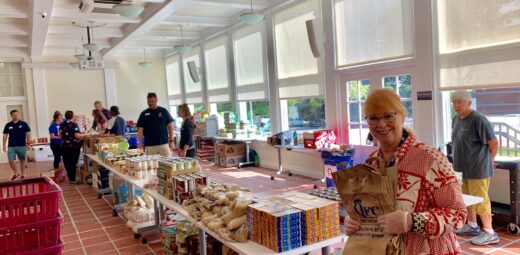
Jul 25Food Insecurity – Beyond the Statistics
According to a 2021 USDA report, nearly 90% (116.7 million) of all U.S. households had access to enough food to lead healthy and active lives.
That same study also showed about 1 in 10 households (13.8 million) were food insecure at some point during 2020, which, when breaking that number down, translates to 38.2 million people, including 6.1 million children.
What does that mean? It means that while most households were food secure, nearly 14 million households were food insecure – unsure they would have enough food to feed their families because they didn’t have enough money or didn’t have access to other resources to buy food.
Mercy Housing has been addressing the needs of residents for decades through our service-enriched programs. As we have grown, so have our resources. In 2020, over 12,700 households received food assistance through Mercy Housing’s resident services, including food pantries, meal delivery, and summer lunch programs.
From 2019 to 2021, there was a 17% increase in total food provided to residents and a 25% increase in households receiving that food. Thanks to additional resources for food efforts, household food security increased by 6% in 2019.
Mercy Housing works with numerous community partners across the country who have helped implement new programs ensuring that residents have access to healthy and nutritional food items.
Mercy Housing Community Partnerships

Community partnerships play a large role in helping Mercy Housing address food insecurity. For example, through our partnership with Community Memorial Foundation in Illinois, Countryside Senior Apartment residents look forward to having fresh food delivered to the onsite food pantry on a regular basis.
At Mercy Housings Batavia Apartments, property staff is helping residents with food by providing a monthly pop-up food pantry. In addition, the Farmer’s Market team informs residents about unlimited SNAP (formerly food stamps) matching benefits that can be used for fresh fruits and vegetables. While the University of Illinois works with Mercy Housing property staff in sharing healthy recipe ideas with residents. That’s not all! Staff from Garden Works has been onsite teaching residents how to grow their own healthy gardens.
Meanwhile, the food pantry at Mercy Magnuson Place in Washington State is a collaborative effort with four partners from the community: The University District Food Bank, MHNW, YMCA, and Solid Ground. The food pantry is open every Wednesday and offers fresh produce as well as dairy, grains, non-perishable goods, and even pet food for our furry friends. On average, residents leave with about 30 lbs. of food, which helps to offset their monthly budgets.
We also have several relationships with food delivery trucks, pantries, kitchens, etc., in various regions, including a very strong relationship with Northern Illinois Food Bank for many of our suburban IL properties. Hunger Task Force is an important partner in Wisconsin.
Investing in Healthier Mercy Housing Communities

Thanks to a 2020 $1 million grant from the Stupski Foundation, Mercy Housing California has begun to take significant steps toward expanding access to nutritious and fresh foods for residents of Sunnydale. The grant also allows Mercy Housing and partners to implement a series of community-driven initiatives, including supporting a teaching kitchen and culinary medicine program partnership with Kaiser Permanente and welcoming a green-grocer to operate out of the ground floor space in the Sunnydale community.
Soon, Sunnydale residents will also be able to harvest their own produce and herbs while cultivating the gardening expertise that many residents already hold.
And thanks to the Stupski Foundation, Mercy Housing Sunnydale residents have direct access to new and innovative solutions that address food insecurity.
Feeding Their Souls Through Volunteerism
Long-time community partner and volunteer at Francis Heights, Nancy and her colleague Alex saw that there had been an increased demand for both food and volunteers at this 383-apartment senior community in Denver and answered the call for help by volunteering their time to help fill food bags in the pantry. But they didn’t stop there; Nancy and Alex delivered each bag with essential food items directly to each resident.
“I enjoy giving back to an organization that provides a home to low-income seniors, as well as families. It’s a pleasure to support the residents with activities that can help put a smile on their faces. For me, giving back to the community is “food for my soul,” and I look forward to continuing this partnership for years to come,” said Nancy.
Addressing the Social Determinants of Health

The social determinants of health are the environmental conditions where people are born, live, learn, work, play, worship, and age that affect a wide range of health, functioning, and quality-of-life outcomes and risks. That includes access to healthy foods.
We know that improved health and home environment are the foundation for people to access education, childcare, job opportunities, and economic stability – all of which fall under the social determents of health, along with food security. Mercy Housing is making wellness more accessible for residents by working with major healthcare systems across the United States. These partnerships help provide enhanced services that contribute to the well-being and health of the thousands of residents we serve.
Our approach to service-enriched affordable housing addresses the social determinants of health by providing residents with a stable and healthy environment where everyone can thrive. For 40 years, Mercy Housing has worked to create stable, vibrant, and healthy communities.
No related posts.
Stay Up To Date
Get news on Mercy Housing and inspiring stories of change delivered to your inbox.


